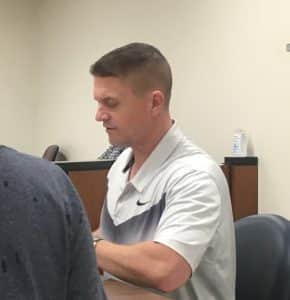News
May 26, 2023
By: Dwayne Page
Good news, bad news!
First the good news! The percentage of DeKalb County third graders who either met or exceeded expectations in Reading on the 2023 TCAP Assessment was 42.26%, significantly better than the 26% result from last year. The bad news is that almost 58% (57.74%) only approached or were below expectations and face the risk of retention. That was still better than the state average of 60% which didn’t measure up.
“Are we happy with 42% passing the test and 58% not? No! Its not what we want. We want 100% passing but the number of kids being held back in third grade doesn’t have to happen. There are some hoops they have to jump through, summer school and things of that nature, but from where we started last year, when only 26% passed the test, we have improved greatly and that goes to show that when you (teachers and administrators) get in that curriculum and teach what the state sends with fidelity students will have success” said Director of Schools Patrick Cripps.
The Tennessee Department of Education this week released district-level TCAP average scores across the state for third grade ELA from the spring 2023 TCAP administration.
The department also released statewide averages for third grade TCAP ELA scores ahead of previous years’ timelines, highlighting historic gains in third grade reading after the launch of a new, comprehensive K-3 literacy strategy for Tennessee public schools.
The DeKalb County School District is sending correspondence to parents of students who didn’t make the grade outlining the path forward for their promotion to fourth grade. Those students will either have to re-take the test, go to summer school, undergo tutoring next school year, or appeal the decision based on the Third Grade Retention Law. There are several exemptions to the law, like students with disabilities that affect their reading and certain English language learners.
The DeKalb County data is broken down as follows:
• 13.62% exceeded expectations
• 28.64% met expectations
• 32.86% approached expectations
• 24.88% below expectations
“Providing districts, schools, and families with data about how their students are performing is essential,” said Commissioner Penny Schwinn. “I appreciate the dedication and ongoing efforts of Tennessee districts and schools as they work with families to help them choose the best pathway for their children and their future success.”
Last Friday, May 19th, individual student ELA scores for third graders were shared with Tennessee school districts, which are responsible for communicating with families about their student’s score and pathways to fourth grade promotion, including the TCAP retake opportunity, parent appeal free summer camp and/or tutoring in the upcoming school year.
Third grade students who scored “below” or “approaching” are eligible and will be prioritized for these supports, although some students may meet certain exceptions outlined in the law.
Thanks to legislation passed by Governor Bill Lee and the Tennessee General Assembly, the grades eligible for all summer learning camps has been expanded to rising kindergarten through 9th grade students, which are meant to support students who will benefit from additional learning supports and meet the participation requirements for promotion to fourth grade. In the coming weeks, districts and schools will work with families to determine the best pathway for their student.
Families of students scoring “approaching” on the TCAP or TCAP retest also have the option to request an appeal of a local retention decision on behalf of their third-grade student. The form to submit an appeal for the department’s consideration will be on this webpage and opens May 30, 2023 and closes June 30, 2023.
Families can find critical timeline information posted on the department’s website and should coordinate with their student’s school to ensure they can make informed decisions about their student’s education. The annual, full TCAP release, including all grades and subjects for state-level and district-level results, will be released in separate announcements later this summer.
Pandemic Assistance Revenue Program Signup Ends June 2
May 26, 2023
By:
U.S. Department of Agriculture (USDA) Farm Service Agency (FSA) Executive Director Donny Green, in DeKalb and Cannon counties, reminds producers of agricultural commodities that the signup period for the Pandemic Assistance Revenue Program (PARP) ends Friday,
June 2, 2023.
Producers of eligible commodities who suffered at least a 15% loss in gross revenue in calendar year 2020, as compared to either 2018 or 2019 gross revenue, could qualify for direct financial assistance. An agricultural commodity means a crop, aquaculture, livestock, livestock byproduct, or other animal or animal byproduct that is produced as part of a farming operation and is intended to be commercially marketed.
Although not required, interested producers can bring their 2018, 2019, and 2020 IRS Schedule F, Form 1099, or other Federal tax forms to the DeKalb-Cannon County Farm Service Agency to receive assistance in determining revenue loss from these documents.
Please visit the DeKalb/Cannon County FSA office, located at 647 Bright Hill Rd, Smithville, or call 615-597-8225, before the June 2, 2023 signup deadline to inquire about eligibility for financial assistance provided by the Pandemic Assistance Revenue Program (PARP).
School Budget Step Closer to Final Passage
May 26, 2023
By: Dwayne Page
DeKalb County teachers and support staff are a step closer to getting pay raises.
During a meeting Tuesday night, the budget committee voted to recommend passage of the 2023-24 school budget to the full county commission this summer.
Director of Schools Patrick Cripps presented the school budget to the committee.
“The biggest change in our budget from the previous year is we are giving our certified teachers a $3,000 raise and our non-certified staff a $2,000 increase in pay,” said Director Cripps.
“The Governor wants to get the starting salary of teachers (statewide) to be at $50,000 a year. Our teachers are currently at $47,000 (starting salary) and its going to go to $50,000 (statewide) by 2026 but we want to jump ahead ($50,000) now because the field of education is all about competition and we want to be able to recruit teachers to come into our area and one way to do that is to increase salaries. Right now we are the envy of the Upper Cumberland,” said Director Cripps. “ Our starting salary for teachers is currently $47,000 and that puts us in the top five percent in the state so kudos to the county and school board. I truly believe you get what you pay for and if you look at our test results for the last couple of school years, we are seeing improvement in student achievement and student grades. Our ACT results have been climbing and we have many more programs in place now for our students to be career ready. We set goals each year for our ACT program. ACT is our money test and what I mean by that is ACT is what gets kids into college and trade schools and that’s what generates money for them (students) so we have seen an increase in our ACT scores the last few years and this year, for the first time we saw an increase in our subtests and our composite scores so kudos to the high school. DeKalb West School was a Reward School, a level 5 school in growth, and the high school and middle school were level 4’s. We are also making progress in our other schools, and I truly believe we will be able to get them to a level 4 school as well,” said Director Cripps.
With the new budget year will come a change in the state education funding formula.
The Tennessee Investment in Student Achievement (TISA) public school funding formula updates the way Tennessee funds public education for the first time in over 30 years to empower each student to read proficiently by third grade, prepare each high school graduate for postsecondary success, and provide resources needed to all students to ensure they succeed.
The TISA updates the way Tennessee invests in public education by moving to a student-based funding formula, which includes:
•A base funding amount for every public-school student.
•Additional weighted funding to address individual student needs like those students who may be low-income, have a disability, be gifted, have characteristics of dyslexia, or live in a sparse community.
•Additional direct funding intended to support students in key priority areas like early literacy, CTE programming, and high-dosage tutoring.
•Outcome incentives based on student achievement to empower schools to help all students reach their full potential.
Director Cripps explained to the budget committee how the new TISA funding formula will impact the local school district.
“It’s a totally new format for us as far as funding. In the past it was called the Basic Educational (BEP) plan. This is the first year of the TISA plan. That will totally change funding in how we receive our money,” explained Director Cripps.
“In the past the state would give us funding based on the number of students in the school system no matter what kinds of needs they (students) had everybody generated the same amount of funds. It was based on the number of students”.
“TISA generates totally different. Each student is a baseline of $6,800. What it does separately from the Basic Education Plan is it has unique learning needs, special education needs and there is a list of them from 1-10 and those generate a percentage of funding off of the $6,800. You can gain more money for success in schools, doing well on the ACT or passing the third grade in reading tests, or meeting other benchmarks as far as state testing. On the flip side of that, third graders will also generate money for those who didn’t pass the tests and for those in K-2 or K-3 Literacy”.
“We were supposed to have training from the state on how this budget is to be administered but unfortunately the state has not provided that to us yet and these (state funding) numbers are not yet final but even with the BEP plan we didn’t get our final numbers until July. We don’t expect the final numbers to vary greatly from what we are showing right now,” Cripps continued.
Director Cripps outlined other (new spending) highlights in the 2023-24 school budget:
*Tutoring: ($82,500) state funding to tutor students who failed to pass third grade testing. (Amount could change)
*K-3 Literacy: ($439,272) state funding for support and tutoring students in K-3 Literacy
* Local funding to replace approximately $100,000 in federal funding for one teacher, five educational assistants, and one secretary in the Special Education Program.
*Career and Technical Education Program: State (TISA) funding for new Marketing Instruction Program teaching position.
*Local funding for projected 2% increase in employee Medical Insurance premiums
Capital Outlay: Local funding of $400,000 to purchase and install new bleachers and a retaining wall at the DCHS soccer field.
Total school budget expenditures for 2023-24 comes to $29,815,625. The fund balance (cash reserves) as of July 1 is projected at $12,307,672 with a fund balance expected to be $10,472,269 by June 30, 2024. The school district is budgeted to dip into its fund balance if needed by up to $1,835,402 during the year to meet budget by year’s end.
« First ‹ Previous 1 370 460 468 469 470471 472 480 570 2492 Next › Last »










